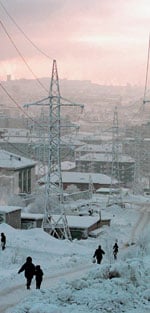Keeping warm on cold nights
Winter in parts of Russia can be bitterly cold – minus 50 degrees Celsius or lower. Under such conditions, a reliable and cost-efficient heating system is hardly a luxury.
DATE 2023-11-28 AUTHOR Birgitta Lundblad There's no doubt that heating networks, systems and plants in Russia are in need of renovation. Most of them are 25 to 30 years old, and they don't meet today's standards of efficiency and environmental adaptation.
There's no doubt that heating networks, systems and plants in Russia are in need of renovation. Most of them are 25 to 30 years old, and they don't meet today's standards of efficiency and environmental adaptation.
But a comprehensive renovation program requires huge investments, and in cash-strapped Russia, that means financial assistance.
International investors and organizations like the World Bank, the European Bank of Reconstruction & Development (EBRD) and Sida are increasing their activities to ease financial problems in Russia and the rest of the former Soviet Union.
Of several ongoing renovation projects in Russia, the World Bank directs three of the largest.
The Enterprise Housing divestiture project (EHDP)
This project involves renovation of buildings to minimize energy consumption. Investments include heat exchangers for individual thermal substations and small boilers.
The cities of Petrozavodsk, Cherepovets, Orenburg, Ryazan, Vladimir and Volkhov are involved in this project. Design and planning work started in 1997, and the first installations were made in Petrozavodsk and Cherepovets in 1998. By the end of 2000, Alfa Laval had supplied 300 plate heat exchanger units for the EHDP project.
Energy Efficiency projectThe main purpose of the Energy Efficiency Project is to renovate and improve all the systems belonging to a city's heating network, such as the heating source, central heating plants and individual thermal substations. Full renovation of heating network pipelines is not included in the project.
Kaliningrad, the most eastern city in Russia, has already come far in this process. So far, Alfa Laval has delivered more than 60 plate heat exchangers for central heating substations for this project. Heat exchanger supplies for individual thermal substations and central heating plants are also in the pipeline.
The Municipal Heating Project
This project currently involves nine cities: Mitishi, Nerungri, Dubna, Syzran, Krasnojarsk, Tambov, Volgograd, Vladivostok (Primorje) and Kazan. The purpose is the same as for the Energy Efficiency Project, but the renovation also includes complete renovation of heating network pipelines.
Analyses, technical specifications and international competitive bidding procedures have already been completed, and it presumably will not be long before decisions are made on matters like financing and management.
Sweden has comprehensive knowledge of district heating and has established cooperation with Central and Eastern Europe in this field.
The Swedish Council for District Heating (SweHeat) is a joint undertaking by Swedish companies and organizations in the district heating sector. SweHeat arranged a study tour, which included a visit to Alfa Laval headquarters for district heating managers and mayors representing several of the nine cities involved in the Municipal Heating Project. Representatives of the state-owned CPIU (Central Project Implementation Unit) are cooperating with organizations such as the World Bank and SIDA, participated as well.
"Improving municipal heating systems in Russia is crucial to saving energy," says Calle Hillström, Swedish representative of CPIU. "The efficiency of the systems in Russia is currently two or three times lower than those in Sweden. So there are great improvement potentials – but also large investment needs. The purchase of equipment and services for this project is estimated at 85 million U.S. dollars."
Demanding conditions
Mitishi in the Moscow region is one of the cities planning to completely renovate its heating network. "Our intention is to get the best solution with the most reliable equipment to be found in the market," says Youri Kazanov, director of the Mitishi Heating Co. "We focus on two main criteria. First, we want the most cost-efficient system that minimizes consumption of expensive fuel. Saving of energy must have top priority in Russia today. Second, and equally important, are our high environmental demands.
"For instance, leakage in existing pipelines causes environmental problems. By using modern heat exchange technology like Alfa Laval's we would need less piping. Alfa Laval is well known here in Russia. Most new buildings have their plate heat exchangers installed. The fact that the company has a factory in Moscow is also an important factor for us."
The city of Nerungri in Eastern Siberia measured the lowest temperature in Russia last winter – a breathtaking minus 57 degrees Celsius. Vassilij Startsev, head of the Nerungri city administration, says that having reliable equipment under such circumstances is of utmost importance.
"What I saw on the company's premises today convinced me of the high quality of Alfa Laval's products."
Vladimir Filippov is head of the Department of Energy and Energy Saving in Krasnoyarsk, another city that had a very hard winter. He says the city needs to replace its inefficient shell-and-tube heat exchangers with new energy-saving plate heat exchangers, which can avoid leakage and decrease maintenance costs.
"We also need more capacity, and existing systems cannot cope with more houses," he says.
Actual savings
Substantial savings have been measured in some cities (Cherepovets, Petrozavodsk & Orenburg) after carrying out the renovation of individual heat points.
Heat savings in Domestic Hot Water (DHW) heat points: 16-25 %
Hot water savings in DHW heat points: 13-14 %
Heat saving in Space Heating (SH) heat points: 23 % + increased comfort (Here is a potential saving of a further 10 %)
Cold water savings: 10 %
Gas savings: 8-12 %
